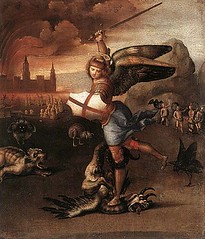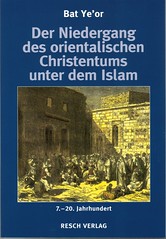Mohammedanism was a heresy
Now, why did this new, simple, energetic heresy have its sudden overwhelming success? One answer is that it won battles. It won them at once, as we shall see when we come to the history of the thing. But winning battles could not have made Islam permanent or even strong had there not been a state of affairs awaiting some such message and ready to accept it. Both in the world of Hither Asia and in the Graeco-Roman world of the Mediterranean, but especially in the latter, society had fallen, much as our society has today, into a tangle wherein the bulk of men were disappointed and angry and seeking for a solution to the whole group of social strains. There was indebtedness everywhere; the power of money and consequent usury. There was slavery everywhere. Society reposed upon it, as ours reposes upon wage slavery today. There was weariness and discontent with theological debate, which, for all its intensity, had grown out of touch with the masses. There lay upon the free men, already tortured with debt, a heavy burden of imperial taxation; and there was the irritant of existing central government interfering with men's lives; there was the tyranny of the lawyers and their charges. To all this Islam came as a vast relief and a solution of strain. The slave who admitted that Mohammed was the prophet of God and that the new teaching had, therefore, divine authority, ceased to be a slave. The slave who adopted Islam was henceforward free. The debtor who "accepted" was rid of his debts. Usury was forbidden. The small farmer was relieved not only of his debts but of his crushing taxation. Above all, justice could be had without buying it from lawyers. . . . All this in theory. The practice was not nearly so complete. Many a convert remained a debtor, many were still slaves. But wherever Islam conquered there was a new spirit of freedom and relaxation. It was the combination of all these things, the attractive simplicity of the doctrine, the sweeping away of clerical and imperial discipline, the huge immediate practical advantage of freedom for the slave and riddance of anxiety for the debtor, the crowning advantage of free justice under few and simple new laws easily understood -- that formed the driving force behind the astonishing Mohammedan social victory. The courts were everywhere accessible to all without payment and giving verdicts which all could understand. The Mohammedan movement was essentially a "Reformation," and we can discover numerous affinities between Islam and the Protestant Reformers -- on Images, on the Mass, on Celibacy, etc. The marvel seems to be, not so much that the new emancipation swept over men much as we might imagine Communism to sweep over our industrial world today, but that there should still have remained, as there remained for generations, a prolonged and stubborn resistance to Mohammedanism. There you have, I think, the nature of Islam and of its first original blaze of victory. We have just seen what was the main cause of Islam's extraordinarily rapid spread; a complicated and fatigued society, and one burdened with the institution of slavery; one, moreover, in which millions of peasants in Egypt, Syria and all the East, crushed with usury and heavy taxation, were offered immediate relief by the new creed, or rather, the new heresy. Its note was simplicity and therefore it was suited to the popular mind in a society where hitherto a restricted class had pursued its quarrels on theology and government. That is the main fact which accounts for the sudden spread of Islam after its first armed victory over the armies rather than the people of the Greek-speaking Eastern Empire. But this alone would not account for two other equally striking triumphs. The first was the power the new heresy showed of absorbing the Asiatic people of the Near East, Mesopotamia and the mountain land between it and India. The second was the wealth and the splendour of the Caliphate (that is, of the central Mohammedan monarchy) in the generations coming immediately after the first sweep of victory. The first of these points, the spread over Mesopotamia and Persia and the mountain land towards India, was not, as in the case of the sudden successes in Syria and Egypt, due to the appeal of simplicity, freedom from slavery and relief from debt. It was due to a certain underlying historical character in the Near East which has always influenced its society and continues to influence it today. That character is a sort of natural uniformity. There has been inherent in it from times earlier than any known historical record, a sort of instinct for obedience to one religious head, which is also the civil head, and a general similarity of social culture. When we talk of the age-long struggle between Asia and the West, we mean by the word "Asia" all that sparse population of the mountain land beyond Mesopotamia towards India, its permanent influence upon the Mesopotamian plains themselves, and its potential influence upon even the highlands and sea coast of Syria and Palestine. The struggle between Asia and Europe swings over a vast period like a tide ebbing and flowing. For nearly a thousand years, from the conquest of Alexander to the coming of the Mohammedan Reformers (333 B.C.-634), the tide had set eastward; that is, Western influences -- Greek, and then Greek and Roman -- had flooded the debatable land. For a short period of about two and a half to three centuries even Mesopotamia was superficially Greek -- in its governing class, at any rate. Then Asia began to flood back again westward. The old Pagan Roman Empire and the Christian Empire, which succeeded it and which was governed from Constantinople, were never able to hold permanently the land beyond the Euphrates. The new push from Asia westward was led by the Persians, and the Persians and Parthians (which last were a division of the Persians) not only kept their hold on Mesopotamia but were able to carry out raids into Roman territory itself, right up to the end of that period. In the last few years before the appearance of Mohammedanism they had appeared on the Mediterranean coast and had sacked Jerusalem. Now when Islam came with its first furious victorious cavalry charges springing from the desert, it powerfully reinforced this tendency of Asia to reassert itself. The uniformity of temper which is the mark of Asiatic society, responded at once to this new idea of one very simple, personal form of government, sanctified by religion, and ruling with a power theoretically absolute from one centre. The Caliphate once established at Bagdad, Bagdad became just what Babylon had been; the central capital of one vast society, giving its tone to all the lands from the Indian borders to Egypt and beyond.
But even more remarkable than the flooding of all near Asia with Mohammedanism in one lifetime was the wealth and splendour and culture of the new Islamic Empire. Islam was in those early centuries (most of the seventh, all the eighth and ninth), the highest material civilization of our occidental world. The city of Constantinople was also very wealthy and enjoyed a very high civilization, which radiated over dependent provinces, Greece and the seaboard of the Aegean and the uplands of Asia Minor, but it was focussed in the imperial city; in the greater part of the country-sides culture was on the decline. In the West it was notoriously so. Gaul and Britain, and in some degree Italy, and the valley of the Danube, fell back towards barbarism. They never became completely barbaric, not even in Britain, which was the most remote; but they were harried and impoverished, and lacked proper government. From the fifth century to the early eleventh (say A.D. 450 to A.D. 1030) ran the period which we call "The Dark Ages" of Europe -- in spite of Charlemagne's experiment.
So much for the Christian world of that time, against which Islam was beginning to press so heavily; which had lost to Islam the whole of Spain and certain islands and coasts of the central Mediterranean as well. Christendom was under siege from Islam. Islam stood up against us indominating splendour and wealth and power, and, what was even more important, with superior knowledge in the practical and applied sciences. Islam preserved the Greek philosophers, the Greek mathematicians and their works, the physical science of the Greek and Roman earlier writers. Islam was also far more lettered than was Christendom. In the mass of the West most men had become illiterate. Even in Constantinople reading and writing were not as common as they were in the world governed by the Caliph. One might sum up and say that the contrast between the Mohammedan world of those early centuries and the Christian world which it threatened to overwhelm was like the contrast between a modern industrialized state and a backward, half-developed state next door to it: the contrast between modern Germany, for instance, and its Russian neighbor. The contrast was not as great as that, but the modern parallel helps one to understand it. For centuries to come Islam was to remain a menace, even though Spain was re-conquered. In the East it became more than a menace, and spread continually for seven hundred years, until it had mastered the Balkans and the Hungarian plain, and all but occupied Western Europe itself. Islam was the one heresy that nearly destroyed Christendom through its early material and intellectual superiority.
Now why was this? It seems inexplicable when we remember the uncertain and petty personal leaderships, the continual changes of local dynasties, the shifting foundation of the Mohammedan effort. That effort began with the attack of a very few thousand desert horsemen, who were as much drawn by desire for loot as by their enthusiasm for new doctrines. Those doctrines had been preached to a very sparse body of nomads, boasting but very few permanently inhabited centres. They had originated in a man remarkable indeed for the intensity of his nature, probably more than half convinced, probably also a little mad, and one who had never shown constructive ability -- yet Islam conquered. Mohammed was a camel driver, who had had the good luck to make a wealthy marriage with a woman older that himself. From the security of that position he worked out his visions and enthusiasms, and undertook his propaganda. But it was all done in an ignorant and very small way. There was no organization, and the moment the first bands had succeeded in battle, the leaders began fighting among themselves: not only fighting, but murdering. The story of all the first lifetime, and a little more, after the original rush -- the story of the Mohammedan government (such as itwas) so long as it was centred in Damascus, is a story of successive intrigue and murder. Yet when the second dynasty which presided for so long over Islam, the Abbasides, with their capital further east at Bagdad, on the Euphrates, restored the old Mesopotamian domination over Syria, ruling also Egypt and all the Mohammedan world, that splendour and science, material power and wealth of which I spoke, arose and dazzled all contemporaries, and we must ask the question again: why was this? The answer lies in the very nature of the Mohammedan conquest. It did
Continued
Monday, October 1, 2007
The Great and Enduring Heresy of Mohammed – by Hilaire Belloc - 02
Subscribe to:
Post Comments (Atom)




No comments:
Post a Comment